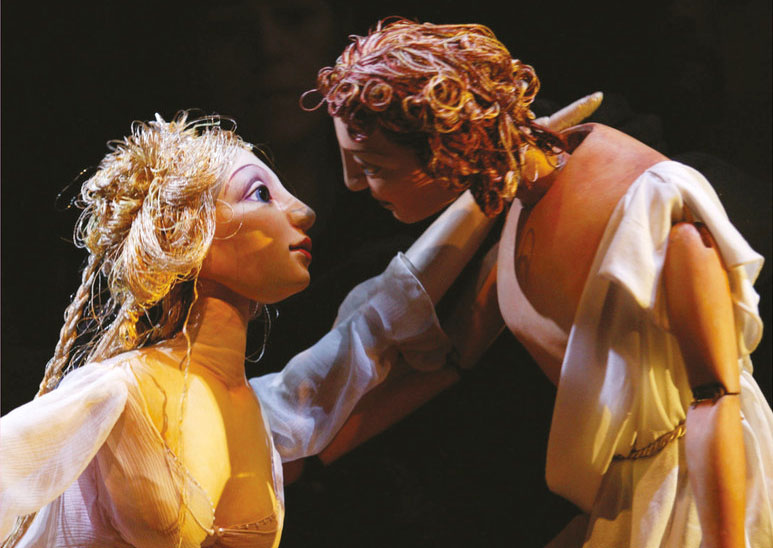
If you are trying to recall all thirty-eight of the plays, don’t. This minor miracle is not amongst them. It’s Gregory Doran’s adaption of Shakespeare’s beautiful, comic and tragic narrative poem, a work which tells you everything you ever wanted to know about romantic love. About sex if you prefer, and the Elizabethans did, instantly placing ‘Venus’ at the top of their best-selling fiction list.
It is minor only in that it runs for approximately one hour and in that it is peopled by exquisite puppets, in a spellbinding collaboration with Little Angel Theatre from Islington in London. They are far more graceful and eternal than mere humans could ever be, and when it comes to the raunchy bits, far funnier and less embarrassing.
Writing it in 1593 when the theatres were dark because of plague, Shakespeare dedicated his poem – as he did The Sonnets, to the androgynously attractive nobleman, Henry Wriothesley. A fact which furnishes the opening scene, in which – sadly for the balding writer, the young earl is intent on romancing a woman and ignores the proffered book.
Its story is of Venus, the Goddess of Love and her obsession with another irresistible youth: Adonis. Desperate to possess him, she pulls him of his horse. Yet although she persists, he remains haughtily unmoved by her beauty, controlling embraces or arguments. He loves only hunting and insists she respect his innocence and resists harmful lust. He refuses to meet her next day, and sure enough he is killed by a boar as Venus predicted, leaving her to return to Cyprus to mourn her sorrows.
What makes this production so entrancing is its attention to detail. Puppets cannot change expression but, wonderfully constructed and handled, they make every movement tell. A courting ritual between two horses catches the very essence of horse, the wild boar is truly wild, dissolute and terrifying, a hare moves as only hares can, and people walk, glide and dance through the air with captivating poise.
A miniature proscenium arch facilitates events on a wider scale, beginning with Venus’s chariot descending through the skies drawn by doves: whilst what appear to be side curtains become the encompassing, skeletal arms of Death.
Mere humans do get a look in. Predominantly narrator Suzanne Burden, imaginatively interpreting the text and occasionally addressing it to the characters. She is much aided atmospherically by accompaniment and interludes of Dowland-like music from guitarist Nick Lee, whilst Robert Jones’ design and Vince Herbert’s lighting provide an ethereal setting for the encounter.
The real owners of this triumph, however, director Greg Doran apart, are Steve Tiplady and his team of puppet creators and pupeteeers: Louisa Ashton, Edie Edmundson, Rachel Leonard, Avye Leventis, Toby Olie and Alisa Dalling. Visible throughout, they somehow become invisible carers.
All the poem does with its apparent reversal of ‘normal’ gender roles is to provide an insightful treatise on the follies of love and desire. But then what would life be without them? ★★★★★ Derek Briggs 29th July 2017
Photo by Ellie Kurttz (c) RSC

